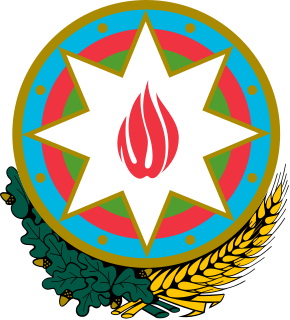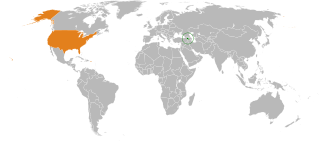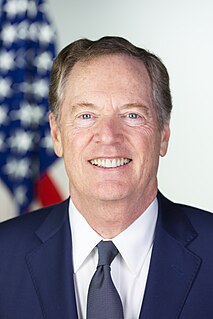Related Research Articles

The Armenian economy contracted sharply in 2020, by 5.7%. In contrast it grew by 7.6 per cent in 2019, the largest recorded growth since 2007, while between 2012 and 2018 GDP grew 40.7%, and key banking indicators like assets and credit exposures almost doubled.

The Office of the United States Trade Representative (USTR) is an agency of the United States federal government responsible for developing and promoting American trade policy. Part of the Executive Office of the President, it is headed by the U.S. Trade Representative, a Cabinet-level position that serves as the U.S. President's primary advisor, negotiator, and spokesperson on trade matters. USTR has more than two hundred employees, with offices in Geneva, Switzerland, and Brussels, Belgium.

The Cabinet of Australia is the chief decision-making organ of the executive branch of the government of Australia. It is a council of senior government ministers, ultimately responsible to Federal Parliament.

The Economic Cooperation Organization or ECO is an Asian political and economic intergovernmental organization which was founded in 1985 in Tehran by the leaders of Iran, Pakistan, and Turkey. It provides a platform to discuss ways to improve development and promote trade and investment opportunities. The ECO is an ad hoc organisation under the United Nations Charter. The objective is to establish a single market for goods and services, much like the European Union. The ECO's secretariat and cultural department are located in Iran, its economic bureau is in Turkey and its scientific bureau is situated in Pakistan.

Clayton Keith Yeutter, ONZM was an American politician who served as United States Secretary of Agriculture under President George H. W. Bush from 1989 to 1991 before serving as Counselor to the President in 1992. He served as United States Trade Representative from 1985 to 1989 and as Chairman for the Republican National Committee from 1991 until 1992. Yeutter was employed as a Senior Advisor at the international law firm Hogan Lovells in Washington, D.C.

The Azerbaijan Democratic Republic, was the first successful secular democratic republic in the Turkic and Muslim worlds. The ADR was founded by the Azerbaijani National Council in Tiflis on 28 May 1918 after the collapse of the Transcaucasian Democratic Federative Republic. Its established borders were with Russia to the north, the Democratic Republic of Georgia to the north-west, the Republic of Armenia to the west, and Iran to the south. It had a population of around 3 million. Ganja was the temporary capital of the Republic as Baku was under Bolshevik control. The name of "Azerbaijan" which the leading Musavat party adopted, for political reasons, was, prior to the establishment of the Azerbaijan Democratic Republic in 1918, exclusively used to identify the adjacent region of contemporary northwestern Iran.

The National Assembly, also transliterated as Milli Mejlis, is the legislative branch of government in Azerbaijan. The unicameral National Assembly has 125 deputies: previously 100 members were elected for five-year terms in single-seat constituencies and 25 were members elected by proportional representation; as of the latest election, however, all 125 deputies are returned from single-member constituencies.
Section 301 of the U.S. Trade Act of 1974 authorizes the President to take all appropriate action, including tariff-based and non-tariff-based retaliation, to obtain the removal of any act, policy, or practice of a foreign government that violates an international trade agreement or is unjustified, unreasonable, or discriminatory, and that burdens or restricts U.S. commerce. Section 301 cases can be self-initiated by the United States Trade Representative (USTR) or as the result of a petition filed by a firm or industry group. If USTR initiates a Section 301 investigation, it must seek to negotiate a settlement with the foreign country in the form of compensation or elimination of the trade barrier. For cases involving trade agreements, the USTR is required to request formal dispute proceedings as provided by the trade agreements. The law does not require that the U.S. government wait until it receives authorization from the World Trade Organization (WTO) to take enforcement actions, and the President is increasingly focused on enforcing intellectual property (IP) rights under the "Special" 301 amendments but the U.S. has committed itself to pursuing the resolution of disputes under WTO agreements through the WTO dispute settlement mechanism, which has its own timetable.

Matthew James Bryza is a former United States diplomat. His last post in the United States foreign service was the United States Ambassador to Azerbaijan.

Ministry of Foreign Affairs of Azerbaijan is a Cabinet-level governmental agency in Azerbaijan Republic in charge of conducting and designing Azerbaijani Foreign policy.

According to the 2012 U.S. Global Leadership Report, 53% of Azerbaijanis approve of U.S. leadership, with 27% disapproving and 21% uncertain.

The dissolution of the Soviet Union in December 1991 brought an end to the Cold War and created the opportunity for bilateral relations of the United States with Armenia and other New Independent States (NIS) as they began a political and economic transformation. The United States recognized the independence of Armenia on December 25, 1991, and opened an embassy in the capital city of Armenia, Yerevan in February 1992.

Azerbaijanis in Armenia were once the largest ethnic minority in the country, but have been virtually non-existent since 1988–1991 when most either fled the country or were pushed out as a result of the First Nagorno-Karabakh War and the ongoing conflict between Armenia and Azerbaijan. UNHCR estimates the current population of Azerbaijanis in Armenia to be somewhere between 30 and a few hundred people, with the majority of them living in rural areas and being members of mixed couples, as well as elderly or sick. Most of them are reported to have changed their names to maintain low profiles to avoid discrimination.

The Eurasian Economic Union (EAEU) is an economic union of post-soviet states located in Eastern Europe, Western Asia and Central Asia. The Treaty on the Eurasian Economic Union was signed on 29 May 2014 by the leaders of Belarus, Kazakhstan, and Russia, and came into force on 1 January 2015. Treaties aiming for Armenia's and Kyrgyzstan's accession to the Eurasian Economic Union were signed on 9 October and 23 December 2014, respectively. Armenia's accession treaty came into force on 2 January 2015. Kyrgyzstan's accession treaty came into effect on 6 August 2015. Kyrgyzstan participated in the EAEU from the day of its establishment as an acceding state.
The Chief Agricultural Negotiator is an ambassador of the Office of the United States Trade Representative (USTR) responsible for conducting and overseeing international negotiations related to trade in agricultural products. The Chief Agricultural Negotiator is compensated at the rate payable for Level III of the Executive Schedule.
The Global Forum on Migration and Development (GFMD) is a state-led, informal and non-binding process, which helps shape the global debate on migration and development. It provides a flexible, multi-stakeholder space where governments can discuss the multi-dimensional aspects, opportunities and challenges related to migration, development, and the link between these two areas. The GFMD process allows governments - in partnership with civil society, the private sector, the UN system, and other relevant stakeholders – to analyze and discuss sensitive issues, create consensus, pose innovative solutions, and share policy and practices.

Mikheil Janelidze is a chairman of Center for European Governance & Economy and a former Georgian government official who served as Vice Prime Minister (2017–2018), Minister of Foreign Affairs (2015–2018), First Deputy Minister of Foreign Affairs (2015) and Deputy Minister of Economy and Sustainable Development of Georgia (2011-2015).

Robert Emmet Lighthizer is an American attorney and government official who served as the United States Trade Representative from 2017 to 2021.
Steven Patrick Schrage is a former senior G8, White House, State Department, Congressional, and think tank official and academic, who currently heads Delphi Strategy International, a strategic advisory firm. He witnessed the 9/11 attacks on the Pentagon from his seventh floor State Department office and, after evacuating his office in the wake of the attacks, volunteered to oversee international law enforcement efforts in U.S. efforts against terrorism abroad as one of the youngest Deputy Assistant Secretaries of State under Secretary Colin Powell and later as the Co-Chair of the G8’s Anti-Crime and Terrorism Group. Schrage has appeared or provided comments on foreign affairs and politics for major media outlets including NBC Nightly News, Fox News, the BBC, the Washington Post, and the New York Times.

The 2020 Nagorno-Karabakh ceasefire agreement is an armistice agreement that ended the 2020 Nagorno-Karabakh war. It was signed on 9 November by the President of Azerbaijan Ilham Aliyev, the Prime Minister of Armenia Nikol Pashinyan and the President of Russia Vladimir Putin, and ended all hostilities in the Nagorno-Karabakh region from 00:00, 10 November 2020 Moscow time. The president of the self-declared Republic of Artsakh, Arayik Harutyunyan, also agreed to an end of hostilities.
References
 This article incorporates public domain material from the Congressional Research Service document: Jasper Womach. "Report for Congress: Agriculture: A Glossary of Terms, Programs, and Laws, 2005 Edition" (PDF).
This article incorporates public domain material from the Congressional Research Service document: Jasper Womach. "Report for Congress: Agriculture: A Glossary of Terms, Programs, and Laws, 2005 Edition" (PDF).
- ↑ Jrbashyan, T., Barseghyan, H., Slobodyanyuk, V., & Shaboyan, A. (2005). Study of the Economic Impact on the Armenian Economy from Re-Opening of the Turkish-Armenian Borders. Armenian-European Policy and Legal Advice Center (AEPLAC), Yerevan, Armenia.